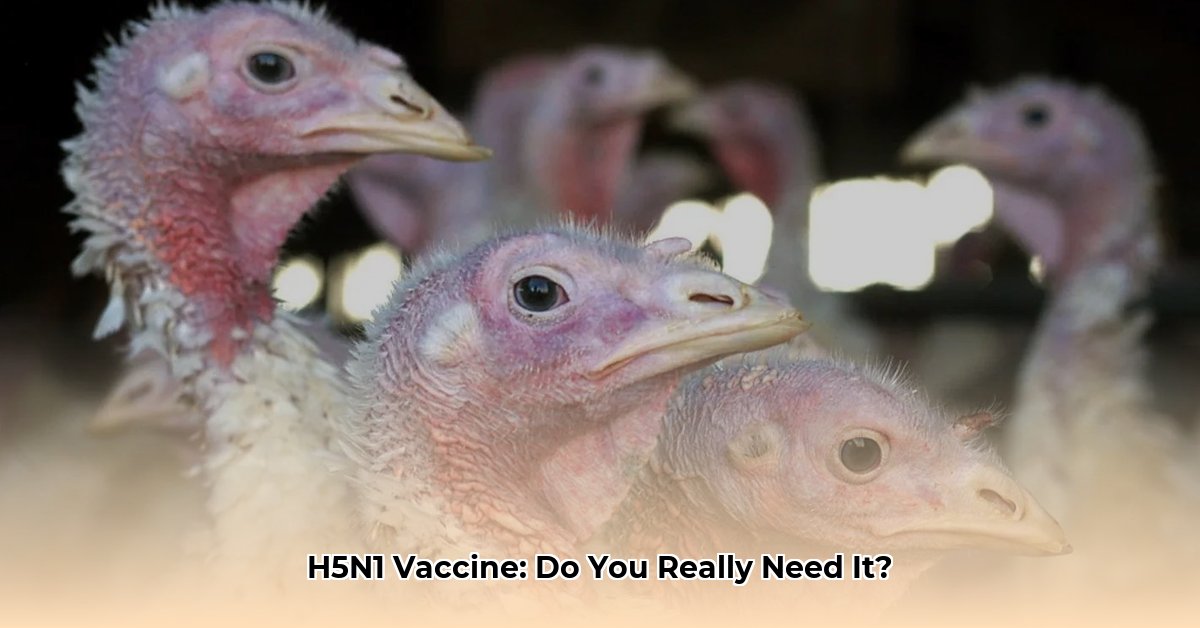Summary:
Currently, there is no avian influenza (H5N1) vaccine readily available for the general public. Vaccines are approved for use in poultry and candidate vaccine viruses for humans are under development, but not yet widely accessible. The current risk to humans is generally low, but health authorities like the CDC and WHO are closely monitoring the situation. For the latest information, always check the CDC and WHO websites.
Frequently Asked Questions
Is there a human vaccine for avian influenza (H5N1)?
Not for the general public. Three avian influenza vaccines are licensed and approved by the FDA, however, they are not readily available to the public. These vaccines are part of a national stockpile, primarily consisting of the CSL Seqirus vaccine, prepared in case of a wider outbreak. Current research focuses on refining existing vaccines and developing new ones, including mRNA vaccines, for potential future use should the need arise.
How effective is the avian flu vaccine?
Clinical trials of the stockpiled avian flu vaccines suggest they are effective. However, like all viruses, H5N1 is constantly evolving. This means ongoing monitoring and research are essential to ensure the vaccines remain effective against emerging strains. It’s similar to updating software to protect against new computer viruses – the defenses need to evolve with the threat.
Is the avian flu vaccine safe? What are the potential side effects?
Trials indicate the vaccines are generally safe. Side effects are typically mild and similar to those of a seasonal flu shot – soreness or redness at the injection site, or perhaps a mild fever. Serious side effects are rare. Continuous safety monitoring and assessment are crucial throughout the vaccine development and deployment process.
Who should get the avian flu vaccine?
Currently, vaccination is primarily recommended for people with occupational exposure to birds, like poultry workers. Close contacts of infected individuals, particularly those exhibiting symptoms such as flu-like illness or conjunctivitis (pink eye), may also be considered for vaccination. Recommendations could change if the virus evolves or the risk to the public increases. Always consult with your doctor or local health authorities for the most up-to-date advice.
Where can I get the avian flu vaccine (if applicable)?
As the vaccine isn’t routinely recommended for the public, it’s not available at pharmacies or doctor’s offices. If wider use becomes necessary, distribution will likely be through designated health departments or clinics. Your doctor and local health authorities will be the best sources of information about vaccine access should recommendations change.
What is the current status of avian influenza (H5N1) vaccine development?
Research is very active. Scientists are exploring different approaches, including traditional methods and newer technologies like mRNA vaccines. Moderna, known for its COVID-19 vaccine, is actively developing an mRNA vaccine for H5N1. This technology allows for quicker development and adaptation to evolving viral strains. The U.S. government has invested substantially in this research, indicating its priority level.
What are governments doing about the avian influenza outbreak and vaccine development?
Governments worldwide are actively involved in monitoring the situation, investing in vaccine research and development, stockpiling vaccines, and developing pandemic preparedness plans. International collaboration is essential to address this potential global health threat.
What is the current risk of avian influenza to humans?
For most people, the risk is currently low. However, continued vigilance and preparedness are crucial. Practicing good hygiene, such as regular handwashing, is always recommended. Staying informed about the latest developments and recommendations from the CDC and WHO is the best way to stay prepared.
What is Avian Influenza (H5N1)?
Avian influenza, or bird flu, is a type of influenza virus that primarily affects birds. The H5N1 strain has caused concern due to its potential to infect humans, generally those with close contact with infected birds. While human-to-human transmission is rare, researchers are actively studying the virus’s evolution and potential to mutate into a form that spreads more readily among humans.
Current Research and Potential Implications
Current research explores various aspects of avian influenza, including:
- Transmission and Mutation Rates: Understanding how the virus spreads and mutates is key to predicting and preventing future outbreaks and developing effective vaccines.
- Antiviral Treatments: Research into antiviral medications seeks to improve treatment options for infected individuals.
- Environmental Factors: Studying how environmental conditions influence the virus’s spread can inform public health measures and preventative strategies.
- Animal-to-Human Transmission: Investigating the dynamics of animal-to-human transmission helps identify high-risk groups and implement effective preventative measures.
Related Information from the CDC and WHO:
Disclaimer: This information is for educational purposes only and does not constitute medical advice. Consult with a healthcare professional for any health concerns.







